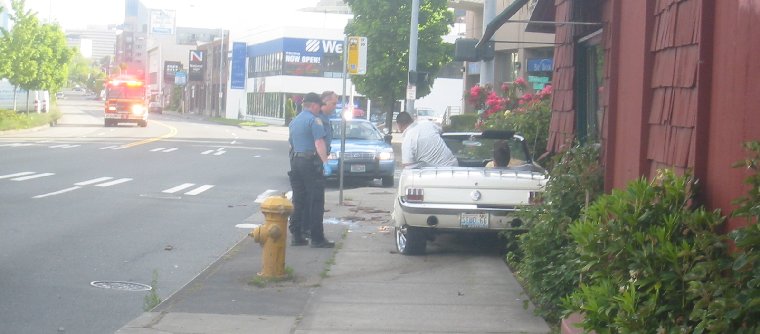| Cars are
purported to be instruments of convenience but they're more symptoms of subservience. How did lives become spread so thin, too little time stretched to breaking over ever-broadening distances? Divide and conquer is more than a mere military axiom, it's the unspoken imperative of capitalism--you will sell more to people who have bought into the American suburban illusion of self-sufficiency. The factory system calls for internal efficiencies to keep costs down but it needs external inefficiencies to turn over more product. Planned obsolescence maintains demand for gadgets and sprawling disconnected communities hunger insatiably for energy to light, heat, and cool oversized single-family homes and ever more oil to fuel the means of overcoming self-imposed isolation from the centers of shared human activity--work, school, markets, worship, and recreation. The automobile is said to conquer distance but a more elegant solution is to localize one's existence. I'm lucky to live in a city where it's possible to get around easily without a car. I bike, bus, and, increasingly, walk. And when I walk, I like to explore new routes. After 12 years, I still haven't trod most Seattle streets. Ruts get worn in deep grooves, usually defined by the the shortest distance between destinations. In a culture where it is assumed that there is never enough time, making haste is a given, which in turn has made us pathologically impatient--as evidenced by the rage with which most drivers react to the most fleeting of delays. Exasperation over petty hindrances is even seen as a virtue, a mark of one's goal-oriented resolve. Sociopathic displays of anger--profanity, threats, faces twisted by disproportionate rage--are so common on American roads as to be considered normal. Fits of pique which would be seen as inappropriate overreactions anywhere else are tacitly accepted so long as they take place in the relative seclusion and virtual anonymity of one's car. |
When walking, biking, or riding mass
transit, one is aware of sharing public space. The little bubbles that we inhabit are permeable at these times, sensitive to others and the minutiae of our surroundings. Automobiles also share public space but seem to their drivers to be private, encapsulated, personal spaces--my climate, my music, my domain--and thus owe no responsibility to those on the "wrong" side of the windshield--the pedestrians, cyclists, and other hurtling metal boxes out there, intangible as if seen on a TV screen. I was prompted to think about the psychology of driving after witnessing a true moron in a '60s muscle car screaming down Dexter Avenue at easily double the speed limit. The top was down and driver and front passenger were laughing idiotically while the rear seat passenger leaned her head back with eyes closed, either afraid to watch or just enjoying the sun. The car was extremely loud and after it passed the stink of burned engine fluid lingered in its wake. I wanted so badly for them to come back so I could flag down the Mustang's driver and ask, "What makes you think it's OK to make so much noise, stink up the air, and recklessly endanger people's lives?" It didn't come back but I could hear its hysterical burble racing up and down nearby streets. About 10 minutes later I rounded a hairpin corner 100 yards from my destination and came nose to nose with the same car, which had apparently skidded out of control and slid sideways into the exterior wall of Pasta Fresca Italian restaurant. It must not have been a high speed impact because there seemed little damage to either vehicle or passengers. The guys in front looked dazed, either wasted on who-knows-what or in mild shock. The front seat passenger was rubbing his nose tentatively while two police officers coaxed the driver into climbing out over the stuck door. The woman in back leaned forward briefly, then resumed her favorite pose, head back, eyes closed, this time more obviously wishing for the scene to disappear. It was lucky for me that I hadn't been on that sidewalk at the wrong time, but more than that I was amazed at the speed with which poetic justice had been served. |
|
|
|
||

